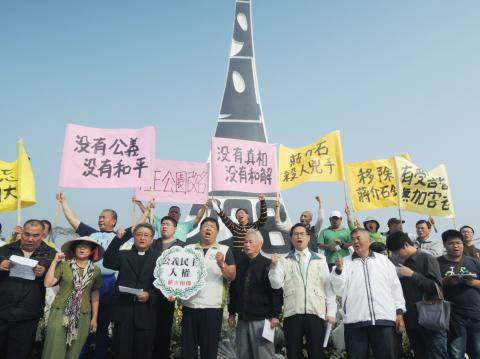|
The 228 Incident:
Government urged to honor 228 victims
VICTIMS REMEMBERED: The families of victims of
the 228 Massacre urged the public and the government to protect and cherish the
nation’s hard-won democracy
By Mo Yan-chih, Chan Shih-hung, and Jason Pan / Staff reporters,
with Staff writer

People protest on the streets of
Chiayi County yesterday, calling on the government to tell the facts about the
228 Incident.
Photo: Yu Hsueh-lan, Taipei Times
Families of victims of the 228 Massacre
yesterday urged the government to pursue the interests of the majority of the
public while protecting the rights of minorities.
Wang Zan-hung (王贊紘), 228 victim Wang Tien-teng’s (王添燈) grandson, who represented
families of the victims in speaking at a memorial ceremony organized by the
Taipei City Government, said the anniversary was a day of sadness, pain,
resentment and hope for victims’ families.
Speaking about the impact of the incident on his family, Wang Zan-hung said his
father refrained from talking about the time when his grandfather was taken away
by soldiers in March 1947, and was never seen again. Wang Zan-hung’s father
finally showed his deep sorrow by bursting into tears while holding a statue of
his father many years later.
“My father is 80 years old and suffers from dementia and he often asks us
whether police would take him away. His condition is a painful reminder that the
228 Incident has left a permanent scar on my family,” Wang Zan-hung said at the
Taipei 228 Peace Memorial Park. He described the 228 Incident as a reminder of
the threats to democracy and urged the government to recognize the public’s
efforts to defend the nation’s democracy and human rights.
“Those who are in power should work hard to provide happiness for the majority
of their people. At the same time, they should try their best to protect the
rights of minorities,” he said.
President Ma Ying-jeou (馬英九), who attended the annual event, agreed that the
incident had inspired pro-democracy movements. He promised to institutionalize
the protection of human rights in the nation and prevent similar incidents from
happening again.
“I am here to promise again that the government will defend democracy and
freedom in Taiwan. It is crucial to consolidate the core values of democracy and
institutionalize the protection of human rights so that tragedies like the 228
Incident will not happen again,” he said.
A number of 228 Incident commemorative events were held nationwide yesterday.
In Yunlin County’s Huwei Township (虎尾), Yunlin County Commissioner Su Chih-fen
(蘇治芬) led a procession of officials and well-wishers to pay respects to the
families of 228 Incident victims who were present at the event.
“[Taiwan’s] democracy was achieved through the sacrifice and toil of many
people. We must come together in unity and live in harmony. People should not
just raise the DPP banner without giving due gratitude and appreciation,” Su
said at the commemoration held at the Sansinggong Temple (三姓公廟).
The temple was built to honor three men — medical doctor Ku Shang-tai (顧尚泰),
herbal medical doctor Lee Chih-fang (李持芳) and printshop technician Wang Chi-ning
(王濟寧).
The three were good friends from Taichung City who were arrested in the streets
of Huwei during the 228 Incident and summarily executed by Chinese Nationalist
Party (KMT) soldiers.
Local residents retrieved their bodies for burial and later built the temple to
remember them.
Wang Ching-pei (王清培), the 78-year-old younger brother of Wang Chi-ning, was at
the event yesterday. Wang Ching-pei was overcome with grief and cried as guest
speakers recounted the 228 Incident in their speeches.
“We may forget the pain and the agony, but we must never forget history. The 228
Massacre is an important chapter in the history of Taiwan’s transition to
democracy. We must cherish our democracy, which was achieved with much hardship.
We must thank those who came before us for their sacrifice,” former deputy
Yunlin Commissioner Lin Yuan-chuan (林源泉) said.
|
![]()
![]()
![]()